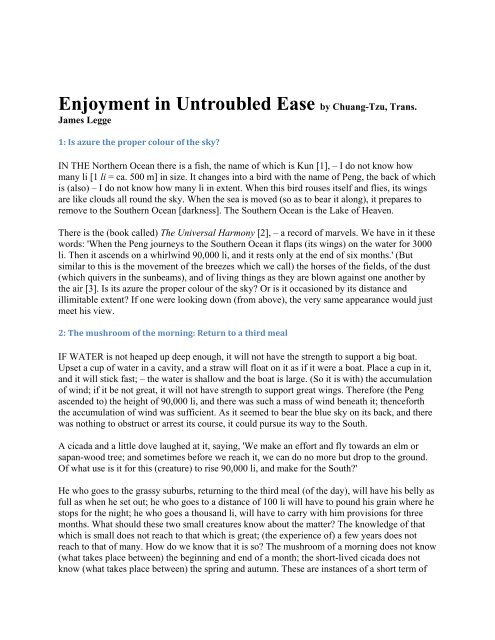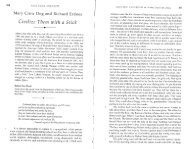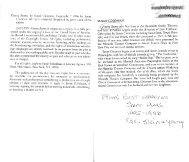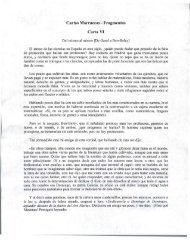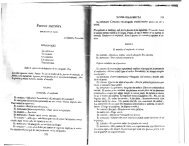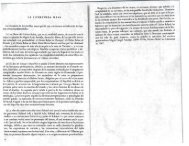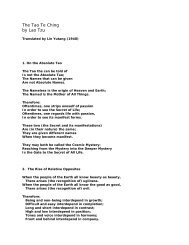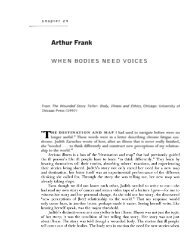Enjoyment in Untroubled Ease by Chuang-Tzu, Trans.
Enjoyment in Untroubled Ease by Chuang-Tzu, Trans.
Enjoyment in Untroubled Ease by Chuang-Tzu, Trans.
Create successful ePaper yourself
Turn your PDF publications into a flip-book with our unique Google optimized e-Paper software.
<strong>Enjoyment</strong> <strong>in</strong> <strong>Untroubled</strong> <strong>Ease</strong> <strong>by</strong> <strong>Chuang</strong>-<strong>Tzu</strong>, <strong>Trans</strong>.<br />
James Legge<br />
1: Is azure the proper colour of the sky?<br />
IN THE Northern Ocean there is a fish, the name of which is Kun [1], – I do not know how<br />
many li [1 li = ca. 500 m] <strong>in</strong> size. It changes <strong>in</strong>to a bird with the name of Peng, the back of which<br />
is (also) – I do not know how many li <strong>in</strong> extent. When this bird rouses itself and flies, its w<strong>in</strong>gs<br />
are like clouds all round the sky. When the sea is moved (so as to bear it along), it prepares to<br />
remove to the Southern Ocean [darkness]. The Southern Ocean is the Lake of Heaven.<br />
There is the (book called) The Universal Harmony [2], – a record of marvels. We have <strong>in</strong> it these<br />
words: 'When the Peng journeys to the Southern Ocean it flaps (its w<strong>in</strong>gs) on the water for 3000<br />
li. Then it ascends on a whirlw<strong>in</strong>d 90,000 li, and it rests only at the end of six months.' (But<br />
similar to this is the movement of the breezes which we call) the horses of the fields, of the dust<br />
(which quivers <strong>in</strong> the sunbeams), and of liv<strong>in</strong>g th<strong>in</strong>gs as they are blown aga<strong>in</strong>st one another <strong>by</strong><br />
the air [3]. Is its azure the proper colour of the sky? Or is it occasioned <strong>by</strong> its distance and<br />
illimitable extent? If one were look<strong>in</strong>g down (from above), the very same appearance would just<br />
meet his view.<br />
2: The mushroom of the morn<strong>in</strong>g: Return to a third meal<br />
IF WATER is not heaped up deep enough, it will not have the strength to support a big boat.<br />
Upset a cup of water <strong>in</strong> a cavity, and a straw will float on it as if it were a boat. Place a cup <strong>in</strong> it,<br />
and it will stick fast; – the water is shallow and the boat is large. (So it is with) the accumulation<br />
of w<strong>in</strong>d; if it be not great, it will not have strength to support great w<strong>in</strong>gs. Therefore (the Peng<br />
ascended to) the height of 90,000 li, and there was such a mass of w<strong>in</strong>d beneath it; thenceforth<br />
the accumulation of w<strong>in</strong>d was sufficient. As it seemed to bear the blue sky on its back, and there<br />
was noth<strong>in</strong>g to obstruct or arrest its course, it could pursue its way to the South.<br />
A cicada and a little dove laughed at it, say<strong>in</strong>g, 'We make an effort and fly towards an elm or<br />
sapan-wood tree; and sometimes before we reach it, we can do no more but drop to the ground.<br />
Of what use is it for this (creature) to rise 90,000 li, and make for the South?'<br />
He who goes to the grassy suburbs, return<strong>in</strong>g to the third meal (of the day), will have his belly as<br />
full as when he set out; he who goes to a distance of 100 li will have to pound his gra<strong>in</strong> where he<br />
stops for the night; he who goes a thousand li, will have to carry with him provisions for three<br />
months. What should these two small creatures know about the matter? The knowledge of that<br />
which is small does not reach to that which is great; (the experience of) a few years does not<br />
reach to that of many. How do we know that it is so? The mushroom of a morn<strong>in</strong>g does not know<br />
(what takes place between) the beg<strong>in</strong>n<strong>in</strong>g and end of a month; the short-lived cicada does not<br />
know (what takes place between) the spr<strong>in</strong>g and autumn. These are <strong>in</strong>stances of a short term of
life. In the south of Ku [2], there is the (tree) called M<strong>in</strong>g-l<strong>in</strong>g, whose spr<strong>in</strong>g is 500 years, and its<br />
autumn the same; <strong>in</strong> high antiquity there was that called Ta Khun, whose spr<strong>in</strong>g was 8000 years,<br />
and its autumn the same. And Master Peng is the one man renowned to the present day for his<br />
length of life: if all men were (to wish) to match him, would they not be miserable?<br />
◑ It is to be expected that short-lived life-forms live on another scale than long-loved ones, and<br />
hold views and notions that fit that scheme of th<strong>in</strong>gs too.<br />
3: Judgement energies<br />
IN THE questions put <strong>by</strong> Tang [1] to Ki we have similar statements: 'In the bare and barren north<br />
there is the dark and vat ocean, – the Pool of Heaven. In it there is a fish, several thousand li <strong>in</strong><br />
breadth, while no one knows its length. Its name is the Kun. There is (also) a bird named the<br />
Peng; its back is like the Tai mounta<strong>in</strong>, while its w<strong>in</strong>gs are like clouds all round the sky. On a<br />
whirlw<strong>in</strong>d it mounts upwards as on the whorls of a goat's horn for 90,000 li, till, far removed<br />
from the cloudy vapours, it bears on its back the blue sky, and then it shapes its course for the<br />
South, and proceeds to the ocean there.' A quail <strong>by</strong> the side of a marsh laughed at it, and said,<br />
'Where is it go<strong>in</strong>g to? I spr<strong>in</strong>g up with a bound, and come down aga<strong>in</strong> when I have reached but a<br />
few fathoms, and then fly about among the brushwood and bushes; and this is the perfection of<br />
fly<strong>in</strong>g. Where is that creature go<strong>in</strong>g to?'<br />
This shows the difference between the small and the great.<br />
Thus it is that men, whose wisdom is sufficient for the duties of some one office, or whose<br />
conduct will secure harmony <strong>in</strong> some one district, or whose virtue is befitt<strong>in</strong>g a ruler so that they<br />
could efficiently govern some one state, are sure to look on themselves <strong>in</strong> this manner (like the<br />
quail), and yet Master Jung of Sung would have smiled and laughed at them. (This Master Jung),<br />
though the whole world should have praised him, would not for that have stimulated himself to<br />
greater endeavour, and though the whole world should have condemned him, would not have<br />
exercised any more repression of his course; so fixed was he <strong>in</strong> the difference between the<br />
<strong>in</strong>ternal (judgement of himself) and the external (judgement of others), so dist<strong>in</strong>ctly had he<br />
marked out the bound<strong>in</strong>g limit of glory and disgrace. Here, however, he stopped. His place <strong>in</strong> the<br />
world <strong>in</strong>deed had become <strong>in</strong>different to him, but still he had not planted himself firmly (<strong>in</strong> the<br />
right position).<br />
There was Master Lieh (Lieh <strong>Tzu</strong>), who rode on the w<strong>in</strong>d and pursued his way with an admirable<br />
<strong>in</strong>difference (to all external th<strong>in</strong>gs), return<strong>in</strong>g, however, after fifteen days, (to his place). In<br />
regard to the th<strong>in</strong>gs that (are supposed to) contribute to happ<strong>in</strong>ess, he was free from all<br />
endeavours to obta<strong>in</strong> them; but though he had not to walk, there was still someth<strong>in</strong>g for which he<br />
had to wait. But suppose one who mounts on (the ether of) heaven and earth <strong>in</strong> its normal<br />
operation, and drives along the six elemental energies of the chang<strong>in</strong>g (seasons), thus enjoy<strong>in</strong>g<br />
himself <strong>in</strong> the illimitable, – what has he to wait for'? Therefore it is said, 'The Perfect man has no<br />
(thought of) self; the Spirit-like man, none of merit; the Sagely-m<strong>in</strong>ded man, none of fame.'<br />
◑ It is hardly best to become <strong>in</strong>different before one has struck root well.
◑ Spiritual atta<strong>in</strong>ments cause deep enjoyments that common people do not know about.<br />
4: Names are like guests of reality ‐<br />
Yao, propos<strong>in</strong>g to resign the throne to Hsü Yu, said,<br />
'When the sun and moon have come forth, if the torches have not been put out, would it not be<br />
difficult for them to give light? When the seasonal ra<strong>in</strong>s are com<strong>in</strong>g down, if we still keep<br />
water<strong>in</strong>g the ground, will not our toil be labour lost for all the good it will do? Do you, Master,<br />
stand forth (as sovereign), and the k<strong>in</strong>gdom will (at once) be well governed. If I still (cont<strong>in</strong>ue<br />
to) preside over it, I must look on myself as va<strong>in</strong>ly occupy<strong>in</strong>g the place; – I beg to resign the<br />
throne to you.'<br />
Hsü Yu said,<br />
'You, Sir, govern the k<strong>in</strong>gdom, and the k<strong>in</strong>gdom is well governed. If I <strong>in</strong> these circumstances<br />
take your place, shall I not be do<strong>in</strong>g so for the sake of the name? But the name is but the guest of<br />
the reality; – shall I be play<strong>in</strong>g the part of the guest? The tailor-bird makes its nest <strong>in</strong> the deep<br />
forest, but only uses a s<strong>in</strong>gle branch; the mole dr<strong>in</strong>ks from the Ho, but only takes what fills its<br />
belly. Return and rest <strong>in</strong> be<strong>in</strong>g ruler, – I will have noth<strong>in</strong>g to do with the throne. Though the cook<br />
were not attend<strong>in</strong>g to his kitchen, the representative of the dead and the officer of prayer would<br />
not leave their cups and stands to take his place.'<br />
5: Far away on a hill there lived someone who preserved a plentiful harvest<br />
Kien Wu asked Lien Shu, say<strong>in</strong>g,<br />
'I heard Khieh-yu talk<strong>in</strong>g words which were great, but had noth<strong>in</strong>g correspond<strong>in</strong>g to them (<strong>in</strong><br />
reality); - once gone, they could not be brought back. I was frightened <strong>by</strong> them; – they were like<br />
the Milky Way which cannot be traced to its beg<strong>in</strong>n<strong>in</strong>g or end. They had no connexion with one<br />
another, and were not ak<strong>in</strong> to the experiences of men.'<br />
'What were his words?' asked Lien Shu, and the other replied,<br />
'(He said) that 'Far away on the hill of Ku She there dwelt a Spirit-like man whose flesh and sk<strong>in</strong><br />
were (smooth) as ice and (white) as snow; that his manner was elegant and delicate as that of a<br />
virg<strong>in</strong>; that he did not eat any of the five gra<strong>in</strong>s, but <strong>in</strong>haled the w<strong>in</strong>d and drank the dew; that he<br />
mounted on the clouds, drove along the fly<strong>in</strong>g dragons, rambl<strong>in</strong>g and enjoy<strong>in</strong>g himself beyond<br />
the four seas; that <strong>by</strong> the concentration of his spirit-like powers he could save men from disease<br />
and pestilence, and secure every year a plentiful harvest.'<br />
These words appeared to me wild and <strong>in</strong>coherent and I did not believe them.<br />
'So it is,' said Lien Shu. 'The bl<strong>in</strong>d have no perception of the beauty of elegant figures, nor the<br />
deaf of the sound of bells and drums. But is it only the bodily senses of which deafness and<br />
bl<strong>in</strong>dness can be predicated? There is also a similar defect <strong>in</strong> the <strong>in</strong>telligence; and of this your
words supply an illustration <strong>in</strong> yourself. That man, with those attributes, though all th<strong>in</strong>gs were<br />
one mass of confusion, and he heard <strong>in</strong> that condition the whole world cry<strong>in</strong>g out to him to be<br />
rectified, would not have to address himself laboriously to the task, as if it were his bus<strong>in</strong>ess to<br />
rectify the world. Noth<strong>in</strong>g could hurt that man; the greatest floods, reach<strong>in</strong>g to the sky, could not<br />
drown him, nor would he feel the fervour of the greatest heats melt<strong>in</strong>g metals and stones till they<br />
flowed, and scorch<strong>in</strong>g all the ground and hills. From the dust and chaff of himself, he could still<br />
mould and fashion Yaos and Shuns; how should he be will<strong>in</strong>g to occupy himself with th<strong>in</strong>gs?'<br />
◑ To "<strong>in</strong>hale the w<strong>in</strong>d" and dispense with food for it, is a yogic breath<strong>in</strong>g method also.<br />
◑ "The concentration of spirit-like powers" - appears to parallell sanyama <strong>in</strong> yoga. Sanyama is<br />
expla<strong>in</strong>ed <strong>in</strong> Patanjali's Yoga Sutras, Book 3; v. 4 ff.<br />
6: Oblivious eyes <strong>in</strong>dicate lack of <strong>in</strong>terest <strong>in</strong> rul<strong>in</strong>g the people<br />
A man of Sung, who dealt <strong>in</strong> the ceremonial caps (of Y<strong>in</strong>), went with them to Yüeh, the people<br />
of which cut off their hair and tattooed their bodies, so that they had no use for them. Yao ruled<br />
the people of the k<strong>in</strong>gdom, and ma<strong>in</strong>ta<strong>in</strong>ed a perfect government with<strong>in</strong> the four seas. Hav<strong>in</strong>g<br />
gone to see the four (Perfect) Ones on the distant hill of Ku She, when (he returned to his capital)<br />
on the south of the Fen water, his throne appeared no more to his deep-sunk oblivious eyes.<br />
7: Consider<strong>in</strong>g the good uses of many th<strong>in</strong>gs<br />
Master Hui told Master <strong>Chuang</strong>, say<strong>in</strong>g,<br />
'The k<strong>in</strong>g of Wei sent me some seeds of a large calabash, which I sowed. The fruit, when fully<br />
grown, could conta<strong>in</strong> five piculs (of anyth<strong>in</strong>g). I used it to conta<strong>in</strong> water, but it was so heavy that<br />
I could not lift it <strong>by</strong> myself. I cut it <strong>in</strong> two to make the parts <strong>in</strong>to dr<strong>in</strong>k<strong>in</strong>g vessels; but the dried<br />
shells were too wide and unstable and would not hold (the liquor); noth<strong>in</strong>g but large useless<br />
th<strong>in</strong>gs! Because of their uselessness I knocked them to pieces.'<br />
Master <strong>Chuang</strong> replied,<br />
'You were <strong>in</strong>deed stupid <strong>in</strong> the use of what was large. There was a man of Sung who was skilful<br />
at mak<strong>in</strong>g a salve which kept the hands from gett<strong>in</strong>g chapped; and (his family) for generations<br />
had made the bleach<strong>in</strong>g of cocoon-silk their bus<strong>in</strong>ess. A stranger heard of it, and proposed to buy<br />
the art of the preparation for a hundred ounces of silver. The k<strong>in</strong>dred all came together, and<br />
considered the proposal. "We have," said they, "been bleach<strong>in</strong>g cocoon-silk for generations, and<br />
have only ga<strong>in</strong>ed a little money. Now <strong>in</strong> one morn<strong>in</strong>g we can sell to this man our art for a<br />
hundred ounces; – let him have it." The stranger accord<strong>in</strong>gly got it and went away with it to give<br />
counsel to the k<strong>in</strong>g of Wu, who was then engaged <strong>in</strong> hostilities with Yüeh. The k<strong>in</strong>g gave him<br />
the command of his fleet, and <strong>in</strong> the w<strong>in</strong>ter he had an engagement with that of Yüeh, on which<br />
he <strong>in</strong>flicted a great defeat, and was <strong>in</strong>vested with a portion of territory taken from Yüeh. The<br />
keep<strong>in</strong>g the hands from gett<strong>in</strong>g chapped was the same <strong>in</strong> both cases; but <strong>in</strong> the one case it led to<br />
the <strong>in</strong>vestiture (of the possessor of the salve), and <strong>in</strong> the other it had only enabled its owners to<br />
cont<strong>in</strong>ue their bleach<strong>in</strong>g. The difference of result was ow<strong>in</strong>g to the different use made of the art.
Now you, Sir, had calabashes large enough to hold five piculs; – why did you not th<strong>in</strong>k of<br />
mak<strong>in</strong>g large bottle-gourds of them, <strong>by</strong> means of which you could have floated over rivers and<br />
lakes, <strong>in</strong>stead of giv<strong>in</strong>g yourself the sorrow of f<strong>in</strong>d<strong>in</strong>g that they were useless for hold<strong>in</strong>g<br />
anyth<strong>in</strong>g. Your m<strong>in</strong>d, my master, would seem to have been closed aga<strong>in</strong>st all <strong>in</strong>telligence!'<br />
◑ Inventive m<strong>in</strong>ds may come up with sound uses for th<strong>in</strong>gs out of the ord<strong>in</strong>ary too.<br />
7b: The useless tree<br />
Master Hui said to Master <strong>Chuang</strong>, 'I have a large tree, which men call the Ailantus. Its trunk swells out<br />
to a large size, but is not fit for a carpenter to apply his l<strong>in</strong>e to it; its smaller branches are knotted and<br />
crooked, so that the disk and square cannot be used on them. Though planted on the wayside, a builder<br />
would not turn his head to look at it. Now your words, Sir, are great, but of no use; – all unite <strong>in</strong> putt<strong>in</strong>g<br />
them away from them.'<br />
Master <strong>Chuang</strong> replied,<br />
'Have you never seen a wildcat or a weasel? There it lies, crouch<strong>in</strong>g and low, till the wanderer<br />
approaches; east and west it leaps about, avoid<strong>in</strong>g neither what is high nor what is low, till it is<br />
caught <strong>in</strong> a trap, or dies <strong>in</strong> a net. Aga<strong>in</strong> there is the Yak, so large that it is like a cloud hang<strong>in</strong>g <strong>in</strong><br />
the sky. It is large <strong>in</strong>deed, but it cannot catch mice. You, Sir, have a large tree and are troubled<br />
because it is of no use; – why do you not plant it <strong>in</strong> a tract where there is noth<strong>in</strong>g else, or <strong>in</strong> a<br />
wide and barren wild? There you might saunter idly <strong>by</strong> its side, or <strong>in</strong> the enjoyment of<br />
untroubled ease sleep beneath it. Neither bill nor axe would shorten its existence; there would be<br />
noth<strong>in</strong>g to <strong>in</strong>jure it. What is there <strong>in</strong> its uselessness to cause you distress?'<br />
◑ To sleep <strong>in</strong> untroubled ease beneath a large, shelter<strong>in</strong>g tree can be a memory of a lifetime also.<br />
The Full Understand<strong>in</strong>g of Life <strong>by</strong> <strong>Chuang</strong>-<strong>Tzu</strong>, <strong>Trans</strong>.<br />
James Legge<br />
1: The conditions of life<br />
He who understands the conditions of life does not strive after what is of no use to life; and he<br />
who understands the conditions of Dest<strong>in</strong>y does not strive after what is beyond the reach of<br />
knowledge. In nourish<strong>in</strong>g the body it is necessary to have beforehand the th<strong>in</strong>gs (appropriate to<br />
its support); but there are cases where there is a superabundance of such th<strong>in</strong>gs, and yet the body<br />
is not nourished. In order to have life it is necessary that it do not have left the body; but there are<br />
cases when the body has not been left <strong>by</strong> it, and yet the life has perished.<br />
When life comes, it cannot be decl<strong>in</strong>ed; when it goes, it cannot be deta<strong>in</strong>ed. Alas! the men of the<br />
world th<strong>in</strong>k that to nourish the body is sufficient to preserve life; and when such nourishment is
not sufficient to preserve the life, what can be done <strong>in</strong> the world that will be sufficient? Though<br />
(all that men can do) will be <strong>in</strong>sufficient, yet there are th<strong>in</strong>gs which they feel they ought to do,<br />
and they do not try to avoid do<strong>in</strong>g them. For those who wish to avoid car<strong>in</strong>g for the body, their<br />
best plan is to abandon the world. Abandon<strong>in</strong>g the world, they are free from its entanglements.<br />
Free from its entanglements, their (m<strong>in</strong>ds) are correct and their (temperament) is equable. Thus<br />
correct and equable, they succeed <strong>in</strong> secur<strong>in</strong>g a renewal of life, as some have done'. In secur<strong>in</strong>g a<br />
renewal of life, they are not far from the True (Secret of their be<strong>in</strong>g). But how is it sufficient to<br />
abandon worldly affairs? and how is it sufficient to forget the (bus<strong>in</strong>ess of) life? Through the<br />
renounc<strong>in</strong>g of (worldly) affairs, the body has no more toil; through forgett<strong>in</strong>g the (bus<strong>in</strong>ess of)<br />
life, the vital power suffers no dim<strong>in</strong>ution. When the body is completed and the vital power is<br />
restored (to its orig<strong>in</strong>al vigour), the man is one with Heaven. Heaven and Earth are the father and<br />
mother of all th<strong>in</strong>gs. It is <strong>by</strong> their union that the body is formed; it is <strong>by</strong> their separation that a<br />
(new) beg<strong>in</strong>n<strong>in</strong>g is brought about. When the body and vital power suffer no dim<strong>in</strong>ution, we have<br />
what may be called the transference of power. From the vital force there comes another more<br />
vital, and man returns to be the assistant of Heaven.<br />
◑ Get free from sordid entanglements <strong>by</strong> be<strong>in</strong>g true.<br />
◑ Some powers can be correctly transferred.<br />
2: The gate‐warden Yi<br />
My master Master Lieh asked Y<strong>in</strong>, (the warden) of the gate, say<strong>in</strong>g,<br />
'The perfect man walks under water without encounter<strong>in</strong>g any obstruction, treads on fire without<br />
be<strong>in</strong>g burned, and walks on high above all th<strong>in</strong>gs without any fear; let me ask how he atta<strong>in</strong>s to<br />
do this?'<br />
The warden Y<strong>in</strong> replied,<br />
'It is <strong>by</strong> his keep<strong>in</strong>g of the pure breath (of life); it is not to be described as an achievement of his<br />
skill or dar<strong>in</strong>g. Sit down, and I will expla<strong>in</strong> it to you. Whatever has form, semblance, sound, and<br />
colour is a th<strong>in</strong>g; how can one th<strong>in</strong>g come to be different from another? But it is not competent<br />
for any of these th<strong>in</strong>gs to reach to what preceded them all; – they are but (form and) visibility.<br />
But (the perfect man) atta<strong>in</strong>s to be (as it were) without form, and beyond the capability of be<strong>in</strong>g<br />
transformed. Now when one atta<strong>in</strong>s to this and carries it out to the highest degree, how can other<br />
th<strong>in</strong>gs come <strong>in</strong>to his way to stop him? He will occupy the place assigned to him without go<strong>in</strong>g<br />
beyond it, and lie concealed <strong>in</strong> the clue which has no end. He will study with delight the process<br />
which gives their beg<strong>in</strong>n<strong>in</strong>g and end<strong>in</strong>g to all th<strong>in</strong>gs. By gather<strong>in</strong>g his nature <strong>in</strong>to a unity, <strong>by</strong><br />
nourish<strong>in</strong>g his vital power, <strong>by</strong> concentrat<strong>in</strong>g his virtue, lie will penetrate to the mak<strong>in</strong>g of th<strong>in</strong>gs.<br />
In this condition, with his heavenly constitution kept entire, and with no crevice <strong>in</strong> his spirit, how<br />
can th<strong>in</strong>gs enter (and disturb his serenity)?<br />
'Take the case of a drunken man fall<strong>in</strong>g from his carriage; – though he may suffer <strong>in</strong>jury, he will<br />
not die. His bones and jo<strong>in</strong>ts are the same as those of other men, but the <strong>in</strong>jury which he receives<br />
is different: his spirit is entire. He knew noth<strong>in</strong>g about his gett<strong>in</strong>g <strong>in</strong>to the carriage, and knew
noth<strong>in</strong>g about his fall<strong>in</strong>g from it. The thought of death or life, or of any alarm or affright, does<br />
not enter his breast; and therefore he encounters danger without any shr<strong>in</strong>k<strong>in</strong>g from it.<br />
Completely under the <strong>in</strong>fluence of the liquor he has drunk, it is thus with him; – how much more<br />
would it be so, if he were under the <strong>in</strong>fluence of his Heavenly constitution! The sagely man is<br />
kept hid <strong>in</strong> his Heavenly constitution, and therefore noth<strong>in</strong>g can <strong>in</strong>jure him.<br />
'A man <strong>in</strong> the pursuit of vengeance would not break the (sword) Mo-yê or Yü-kiang (which had<br />
done the deed); nor would one, however easily made wrathful, wreak his resentment on the<br />
fallen brick. In this way all under heaven there would be peace, without the disorder of assaults<br />
and fight<strong>in</strong>g, without the punishments of death and slaughter: such would be the issue of the<br />
course (which I have described). If the disposition that is of human orig<strong>in</strong> be not developed, but<br />
that which is the gift of Heaven, the development of the latter will produce goodness, while that<br />
of the former would produce hurt. If the latter were not wearied of, and the former not slighted,<br />
the people would be brought nearly to their True nature.'<br />
◑ A drunken man fall<strong>in</strong>g from his carriage may hurt and even kill himself.<br />
◑ In the pursuit of vengeance you can halt to be on the safe side.<br />
3: Take notice enough to succeed<br />
When Kung-ni was on his way to Ku, as he issued from a forest, he saw a hunchback receiv<strong>in</strong>g<br />
cicadas (on the po<strong>in</strong>t of a rod), as if he were pick<strong>in</strong>g them up with his hand.<br />
'You are clever!' said he to the man. 'Is there any method <strong>in</strong> it?'<br />
The hunchback replied,<br />
'There is. For five or six months, I practised with two pellets, till they never fell down, and then I<br />
only failed with a small fraction of the cicadas (which I tried to catch). Hav<strong>in</strong>g succeeded <strong>in</strong> the<br />
same way with three (pellets), I missed only one cicada <strong>in</strong> ten. Hav<strong>in</strong>g succeeded with five, I<br />
caught the cicadas as if I were gather<strong>in</strong>g them. My body is to me no more than the stump of a<br />
broken trunk, and my shoulder no more than the branch of a rotten tree. Great as heaven and<br />
earth are, and multitud<strong>in</strong>ous as th<strong>in</strong>gs are, I take no notice of them, but only of the w<strong>in</strong>gs of my<br />
cicadas; neither turn<strong>in</strong>g nor <strong>in</strong>cl<strong>in</strong><strong>in</strong>g to one side. I would not for them all exchange the w<strong>in</strong>gs of<br />
my cicadas; – how should I not succeed <strong>in</strong> tak<strong>in</strong>g them?'<br />
Confucius looked round, and said to his disciples,<br />
'Where the will is not diverted from its object, the spirit is concentrated; " – this might have been<br />
spoken of this hunchback gentleman.'<br />
◑ Much depends on what you focuses on, and much on where you are.
4: Good handl<strong>in</strong>g and good swimm<strong>in</strong>g<br />
Yen Yü an asked Kung-ni, say<strong>in</strong>g,<br />
'When I was cross<strong>in</strong>g the gulf of Khang-shän, the ferryman handled the boat like a spirit. I asked<br />
him whether such management of a boat could be learned, and he replied, "It may. Good<br />
swimmers can learn it quickly; but as for divers, without hav<strong>in</strong>g seen a boat, they can manage it<br />
at once." He did not directly tell me what I asked; – I venture to ask you what he meant.'<br />
Kung-ni replied,<br />
'Good swimmers acquire the ability quickly; – they forget the water (and its dangers). As to those<br />
who are able to dive, and without hav<strong>in</strong>g seen a boat are able to manage it at once, they look on<br />
the watery gulf as if it were a hill-side, and the upsett<strong>in</strong>g of a boat as the go<strong>in</strong>g back of a<br />
carriage. Such upsett<strong>in</strong>gs and go<strong>in</strong>gs back have occurred before them multitudes of times, and<br />
have not seriously affected their m<strong>in</strong>ds. Wherever they go, they feel at ease on their occurrence.<br />
'He who is contend<strong>in</strong>g for a piece of earthenware puts forth all his skill. If the prize be a buckle<br />
of brass, he shoots timorously; if it be for an article of gold, he shoots as if he were bl<strong>in</strong>d. The<br />
skill of the archer is the same <strong>in</strong> all the cases; but (<strong>in</strong> the two latter cases) he is under the<br />
<strong>in</strong>fluence of solicitude, and looks on the external prize as most important. All who attach<br />
importance to what is external show stupidity <strong>in</strong> themselves.'<br />
◑ Good swimmers at least learn to swim.<br />
◑ Proficient tra<strong>in</strong><strong>in</strong>g is done smoothly, with ease, and should be free from tension.<br />
5: "They who skilfully nourish their life are like shepherds"<br />
Thien Khâi-kih was hav<strong>in</strong>g an <strong>in</strong>terview with duke Wei of Kâu, who said to him,<br />
'I have heard that (your master) Ku Hs<strong>in</strong> has studied the subject of Life. What have you, good<br />
Sir, heard from him about it <strong>in</strong> your <strong>in</strong>tercourse with him?'<br />
Thien Khâi-kih replied,<br />
'In my wait<strong>in</strong>g on him <strong>in</strong> the courtyard with my broom, what should I have heard from my<br />
master?'<br />
Duke Wei said,<br />
'Do not put the question off, Mr. Thien; I wish to hear what you have to say.'<br />
Khâi-kih then replied,
'I have heard my master say that they who skilfully nourish their life are like shepherds, who<br />
whip up the sheep that they see lagg<strong>in</strong>g beh<strong>in</strong>d.'<br />
'What did he mean?' asked the duke. The reply was,<br />
'In Lu there was a Shan Pâo, who lived among the rocks, and drank only water. He would not<br />
share with the people <strong>in</strong> their toils and the benefits spr<strong>in</strong>g<strong>in</strong>g from them; and though he was now<br />
<strong>in</strong> his seventieth year, he had still the complexion of a child. Unfortunately he encountered a<br />
hungry tiger, which killed and ate him. There was also a Kang Î, who hung up a screen at his<br />
lofty door, and to whom all the people hurried (to pay their respects). In his fortieth year, he fell<br />
ill of a fever and died. (Of these two men), Pho nourished his <strong>in</strong>ner man, and a tiger ate his outer;<br />
while I nourished his outer man, and disease attacked his <strong>in</strong>ner. Both of them neglected whipp<strong>in</strong>g<br />
up their lagg<strong>in</strong>g sheep.'<br />
Kung-ni said,<br />
'A man should not retire and hide himself; he should not push forward and display himself; he<br />
should be like the decayed tree which stands <strong>in</strong> the centre of the ground. Where these three<br />
conditions are fulfilled, the name will reach its greatest height. When people fear the dangers of a<br />
path, if one man <strong>in</strong> ten be killed, then fathers and sons, elder brothers and younger, warn one<br />
another that they must not go out on a journey without a large number of reta<strong>in</strong>ers; – and is it not<br />
a mark of wisdom to do so? But there are dangers which men <strong>in</strong>cur on the mats of their beds, and<br />
<strong>in</strong> eat<strong>in</strong>g and dr<strong>in</strong>k<strong>in</strong>g; and when no warn<strong>in</strong>g is given aga<strong>in</strong>st them; – is it not a mark of error?'<br />
◑ It is best to nourish both the <strong>in</strong>ner and outer man. Compare Abraham Maslow's pyramid of<br />
needs.<br />
◑ Beh<strong>in</strong>d much eat<strong>in</strong>g and dr<strong>in</strong>k<strong>in</strong>g lies an awful lot of kill<strong>in</strong>g.<br />
6: The officer of Prayer and the pigs<br />
The officer of Prayer <strong>in</strong> his dark and square-cut robes goes to the pig-pen, and thus counsels the<br />
pigs,<br />
'Why should you shr<strong>in</strong>k from dy<strong>in</strong>g? I will for three months feed you on gra<strong>in</strong>. Then for ten days<br />
I will fast, and keep vigil for three days, after which I will put down the mats of white grass, and<br />
lay your shoulders and rumps on the carved stand; – will not this suit you?'<br />
If he had spoken from the standpo<strong>in</strong>t of the pigs, he would have said,<br />
'The better plan will be to feed us with our bran and chaff, and leave us <strong>in</strong> our pen.'<br />
When consult<strong>in</strong>g for himself, he preferred to enjoy, while he lived, his carriage and cap of office,<br />
and after death to be borne to the grave on the ornamented carriage, with the canopy over his<br />
coff<strong>in</strong>. Consult<strong>in</strong>g for the pigs, he did not th<strong>in</strong>k of these th<strong>in</strong>gs, but for himself he would have<br />
chosen them. Why did he th<strong>in</strong>k so differently (for himself and) for the pigs?
◑ What you would have done to yourself, should you do it to all right others, <strong>in</strong>clud<strong>in</strong>g animals?<br />
What about "Live and let live"?<br />
7: Could a ghost <strong>in</strong>jure you?<br />
(Once), when duke Hwan was hunt<strong>in</strong>g <strong>by</strong> a marsh, with Kwan Kung driv<strong>in</strong>g the carriage, he saw<br />
a ghost. Lay<strong>in</strong>g his hand on that of Kwan Kung, he said to him,<br />
'Do you see anyth<strong>in</strong>g, Father Kung?'<br />
'Your servant sees noth<strong>in</strong>g,' was the reply. The duke then returned, talk<strong>in</strong>g <strong>in</strong>coherently and<br />
becom<strong>in</strong>g ill, so that for several days he did not go out. Among the officers of Khi there was a<br />
Master Hwang Kâo-âo, who said to the duke,<br />
'Your Grace is <strong>in</strong>jur<strong>in</strong>g yourself; how could a ghost <strong>in</strong>jure you? When a paroxysm of irritation is<br />
dispersed, and the breath does not return (to the body), what rema<strong>in</strong>s <strong>in</strong> the body is not sufficient<br />
for its wants. When it ascends and does not descend, the patient becomes accessible to gusts of<br />
anger. When it descends and does not ascend, he loses his memory of th<strong>in</strong>gs. When it neither<br />
ascends nor descends, but rema<strong>in</strong>s about the heart <strong>in</strong> the centre of the body, it makes him ill.'<br />
The duke said,<br />
'Yes, but are there ghostly sprites?'<br />
The officer replied,<br />
'There are about mounta<strong>in</strong> tarns there is the Li; about furnaces, the Khieh; about the dust-heaps<br />
<strong>in</strong>side the door, the Lei-th<strong>in</strong>g. In low-ly<strong>in</strong>g places <strong>in</strong> the north-east, the Pei-a and Wa-lung leap<br />
about, and <strong>in</strong> similar places <strong>in</strong> the north-west there dwells the Yi-yang. About rivers there is the<br />
Wang-hsiang; about mounds, the Hs<strong>in</strong>; about hills, the Khwei; about wilds, the Fang-hwang;<br />
about marshes, the Wei-tho.'<br />
'Let me ask what is the Wei-tho like?' asked the duke. Master Hwang said,<br />
'It is the size of the nave of a chariot wheel, and the length of the shaft. It wears a purple robe and<br />
a red cap. It dislikes the rumbl<strong>in</strong>g noise of chariot wheels, and, when it hears it, it puts both its<br />
hands to its head and stands up. He who sees it is likely to become the leader of all the other<br />
pr<strong>in</strong>ces.'<br />
Duke Hwan burst out laugh<strong>in</strong>g and said,<br />
'This was what I saw.'<br />
On this he put his robes and cap to rights, and made Master Hwang sit with him. Before the day<br />
was done, his illness was quite gone, he knew not how.
L<strong>in</strong> Hsi‐hung: Ensnared <strong>by</strong> the world, men sacrifice their higher life for it, and are not so wise as pigs are<br />
for their life.<br />
◑ What you actually see and th<strong>in</strong>k you see, may be different.<br />
◑ What you th<strong>in</strong>k about what you perceive or hear of, may be what scares you the most if you<br />
have a vivid imag<strong>in</strong>ation and little strength to deal with it.<br />
8: The fight<strong>in</strong>g‐cock for the k<strong>in</strong>g<br />
Master Ki Hs<strong>in</strong>g was rear<strong>in</strong>g a fight<strong>in</strong>g-cock for the k<strong>in</strong>g. Be<strong>in</strong>g asked after ten days if the bird<br />
were ready, he said,<br />
'Not yet; he is still va<strong>in</strong> and quarrelsome, and relies on his own vigour.'<br />
Be<strong>in</strong>g asked the same after other ten days, he said,<br />
'Not yet; he still responds to the crow and the appearance of another bird.'<br />
After ten days more, he replied,<br />
'Not yet. He still looks angrily, and is full of spirit.'<br />
When a fourth ten days had passed, he replied to the question,<br />
'Nearly so. Though another cock crows, it makes no change <strong>in</strong> him. To look at him, you would<br />
say he was a cock of wood. His quality is complete. No other cock will dare to meet him, but<br />
will run from him.'<br />
◑ I would not count on that the silent, unmov<strong>in</strong>g bird scares off others of its k<strong>in</strong>d. In nature<br />
someth<strong>in</strong>g opposite happens.<br />
9: An old man swimm<strong>in</strong>g <strong>in</strong> a large waterfall<br />
Confucius was look<strong>in</strong>g at the cataract near the gorge of Lü, which fell a height of 240 cubits, and<br />
the spray of which floated a distance of forty li, (produc<strong>in</strong>g a turbulence) <strong>in</strong> which no tortoise,<br />
gavial, fish, or turtle could play. He saw, however, an old man swimm<strong>in</strong>g about <strong>in</strong> it, as if he had<br />
susta<strong>in</strong>ed some great calamity, and wished to end his life. Confucius made his disciples hasten<br />
along the stream to rescue the man; and <strong>by</strong> the time they had gone several hundred paces, he was<br />
walk<strong>in</strong>g along s<strong>in</strong>g<strong>in</strong>g, with his hair dishevelled, and enjoy<strong>in</strong>g himself at the foot of the<br />
embankment. Confucius followed and asked him, say<strong>in</strong>g,<br />
'I thought you were a sprite; but, when I look closely at you, I see that you are a man. Let me ask<br />
if you have any particular way of tread<strong>in</strong>g the water.'
The man said,<br />
'No, I have no particular way. I began (to learn the art) at the very earliest time; as I grew up, it<br />
became my nature to practise it; and my success <strong>in</strong> it is now as sure as fate. I enter and go down<br />
with the water <strong>in</strong> the very centre of its whirl, and come up aga<strong>in</strong> with it when it whirls the other<br />
way. I follow the way of the water, and do noth<strong>in</strong>g contrary to it of myself; – this is how I tread<br />
it.'<br />
Confucius said,<br />
'What do you mean <strong>by</strong> say<strong>in</strong>g that you began to learn the art at the very earliest time; that as you<br />
grew up, it became your nature to practise it, and that your success <strong>in</strong> it now is as sure as fate?'<br />
The man replied,<br />
'I was born among these hills and lived contented among them; – that was why I say that I have<br />
trod this water from my earliest time. I grew up <strong>by</strong> it, and have been happy tread<strong>in</strong>g it; – that is<br />
why I said that to tread it had become natural to me. I know not how I do it, and yet I do it; – that<br />
is why I say that my success is as sure as fate.'<br />
◑ Much depends on what you get used to and skilled <strong>in</strong> deal<strong>in</strong>g with from then on.<br />
◑ The phrase "to go with the flow" has taken on other mean<strong>in</strong>gs later.<br />
◑ Some skills are like learn<strong>in</strong>g to ride a bike. Other skills are different.<br />
10: The fabulous bell‐stand<br />
Kh<strong>in</strong>g, the Worker <strong>in</strong> Rottlera wood, carved a bell-stand, and when it was completed, all who<br />
saw it were astonished as if it were the work of spirits. The marquis of Lu went to see it, and<br />
asked <strong>by</strong> what art he had succeeded <strong>in</strong> produc<strong>in</strong>g it.<br />
'Your subject is but a mechanic,' was the reply; 'what art should I be possessed of? Nevertheless,<br />
there is one th<strong>in</strong>g (which I will mention), When your servant had undertaken to make the bellstand,<br />
I did not venture to waste any of my power, and felt it necessary to fast <strong>in</strong> order to<br />
compose my m<strong>in</strong>d. After fast<strong>in</strong>g for three days, I did not presume to th<strong>in</strong>k of any congratulation,<br />
reward, rank, or emolument (which I might obta<strong>in</strong> <strong>by</strong> the execution of my task); after fast<strong>in</strong>g five<br />
days, I did not presume to th<strong>in</strong>k of the condemnation or commendation (which it would<br />
produce), or of the skill or want of skill (which it might display). At the end of the seven days, I<br />
had forgotten all about myself; – my four limbs and my whole person. By this time the thought<br />
of your Grace's court (for which I was to make the th<strong>in</strong>g) had passed away; everyth<strong>in</strong>g that could<br />
divert my m<strong>in</strong>d from exclusive devotion to the exercise of my skill had disappeared. Then I went<br />
<strong>in</strong>to the forest, and looked at the natural forms of the trees. When I saw one of a perfect form,<br />
then the figure of the bell-stand rose up to my view, and I applied my hand to the work. Had I<br />
not met with such a tree, I must have abandoned the object; but my Heaven-given faculty and the
Heaven-given qualities of the wood were concentrated on it. So it was that my spirit was thus<br />
engaged <strong>in</strong> the production of the bell-stand.'<br />
◑ Preparations among artist makers of quality productions differ.<br />
11: Know<strong>in</strong>g horses<br />
Tung-yê Ki was <strong>in</strong>troduced to duke Kwang to exhibit his driv<strong>in</strong>g. His horses went forwards and<br />
backwards with the straightness of a l<strong>in</strong>e, and wheeled to the right and the left with the exactness<br />
of a circle. The duke thought that the l<strong>in</strong>es and circles could not be surpassed if they were woven<br />
with silken str<strong>in</strong>gs, and told him to make a hundred circuits on the same l<strong>in</strong>es. On the road Yen<br />
Ho met the equipage, and on enter<strong>in</strong>g (the palace), and see<strong>in</strong>g the duke, he said,<br />
'Ki 's horses will break down,' but the duke was silent, and gave him no reply. After a little the<br />
horses did come back, hav<strong>in</strong>g broken down; and the duke then said,' How did you know that it<br />
would be so?'<br />
Yen Ho said,<br />
'The horses were exhausted, and he was still urg<strong>in</strong>g them on. It was this which made me say that<br />
they would break down.'<br />
◑ Stop your horses [and prana] before any break-down, and rest till vitality is restored.<br />
◑ Don't push on much if you are exhausted. Stimulants do damage.<br />
12: The artisan Shui<br />
The artisan Shui made th<strong>in</strong>gs round (and square) more exactly than if he had used the circle and<br />
square. The operation of his f<strong>in</strong>gers on (the forms of) th<strong>in</strong>gs was like the transformations of them<br />
(<strong>in</strong> nature), and required no application of his m<strong>in</strong>d; and so his Intelligence I was entire and<br />
encountered no resistance.<br />
◑ Exactness can be tra<strong>in</strong>ed, but avoid overdo<strong>in</strong>g it and there<strong>by</strong> <strong>in</strong>duc<strong>in</strong>g neuroses. Compare dog<br />
experiments <strong>by</strong> Pavlov.<br />
13: Thoughts on mastery<br />
To be unthought of <strong>by</strong> the foot that wears it is the fitness of a shoe; to be unthought of <strong>by</strong> the<br />
waist is the fitness of a girdle. When one's wisdom does not th<strong>in</strong>k of the right or the wrong (of a<br />
question under discussion), that shows the suitability of the m<strong>in</strong>d (for the question); when one is<br />
conscious of no <strong>in</strong>ward change, or outward attraction, that shows the mastery of affairs. He who<br />
perceives at once the fitness, and never loses the sense of it, has the fitness that forgets all about<br />
what is fitt<strong>in</strong>g.
◑ When we are comfortable, we don't have to offer much thought on bodily conditions <strong>by</strong> and<br />
large. It is different when there are aches, strictures and p<strong>in</strong>ches.<br />
◑ Deep ability may not have to be much verbalised.<br />
14: Characteristics of a fit man<br />
There was a Sun Hsiu who went to the door of Master Pien Kh<strong>in</strong>g <strong>Tzu</strong>, and said to him <strong>in</strong> a<br />
strange perturbed way,<br />
'When I lived <strong>in</strong> my village, no one took notice of me, but all said that I did not cultivate (my<br />
fields); <strong>in</strong> a time of trouble and attack, no one took notice of me, but all said that I had no<br />
courage. But that I did not cultivate my fields, was really because I never met with a good year;<br />
and that I did not do service for our ruler, was because I did not meet with the suitable<br />
opportunity to do so. I have been sent about my bus<strong>in</strong>ess <strong>by</strong> the villagers, and am driven away <strong>by</strong><br />
the registrars of the district; – what is my crime? O Heaven! how is it that I have met with such a<br />
fate?'<br />
Master Pien said to him,<br />
'Have you not heard how the perfect man deals with himself? He forgets that he has a liver and<br />
gall. He takes no thought of his ears and eyes. He seems lost and aimless beyond the dust and<br />
dirt of the world, and enjoys himself at ease <strong>in</strong> occupations untroubled <strong>by</strong> the affairs of bus<strong>in</strong>ess.<br />
He may be described as act<strong>in</strong>g and yet not rely<strong>in</strong>g on what he does, as be<strong>in</strong>g superior and yet not<br />
us<strong>in</strong>g his superiority to exercise any control. But now you would make a display of your wisdom<br />
to astonish the ignorant; you would cultivate your person to make the <strong>in</strong>feriority of others more<br />
apparent; you seek to sh<strong>in</strong>e as if you were carry<strong>in</strong>g the sun and moon <strong>in</strong> your hands. That you are<br />
complete <strong>in</strong> your bodily frame, and possess all its n<strong>in</strong>e open<strong>in</strong>gs; that you have not met with any<br />
calamity <strong>in</strong> the middle of your course, such as deafness, bl<strong>in</strong>dness, or lameness, and can still take<br />
your place as a man among other men; – <strong>in</strong> all this you are fortunate. What leisure have you to<br />
murmur aga<strong>in</strong>st Heaven? Go away, Sir.'<br />
Master Sun on this went out, and Master Pien went <strong>in</strong>side. Hav<strong>in</strong>g sitten down, after a little time<br />
he looked up to heaven, and sighed. His disciples asked him why he sighed, and he said to them,<br />
'Hsiu came to me a little while ago, and I told him the characteristics of the perfect man. I am<br />
afraid he will be frightened, and get <strong>in</strong>to a state of perplexity.'<br />
His disciples said,<br />
'Not so. If what he said was right, and what you said was wrong, the wrong will certa<strong>in</strong>ly not be<br />
able to perplex the right. If what he said was wrong, and what you said was right, it was just<br />
because he was perplexed that he came to you. What was your fault <strong>in</strong> deal<strong>in</strong>g with him as you<br />
did?'<br />
Master Pien said,
'Not so. Formerly a bird came, and took up its seat <strong>in</strong> the suburbs of Lu. The ruler of Lu was<br />
pleased with it, and provided an ox, a sheep, and a pig to feast it, caus<strong>in</strong>g also the Kiu-shâo to be<br />
performed to delight it. But the bird began to be sad, looked dazed, and did not venture to eat or<br />
dr<strong>in</strong>k. This was what is called "Nourish<strong>in</strong>g a bird, as you would nourish yourself." He who<br />
would nourish a bird as a bird should be nourished should let it perch <strong>in</strong> a deep forest, or let it<br />
float on a river or lake, or let it f<strong>in</strong>d its food naturally and undisturbed on the level dry ground.<br />
Now Hsiu (came to me), a man of slender <strong>in</strong>telligence, and slight <strong>in</strong>formation, and I told him of<br />
the characteristics of the perfect man, it was like us<strong>in</strong>g a carriage and horses to convey a mouse,<br />
or try<strong>in</strong>g to delight a quail with the music of bells and drums; could the creatures help be<strong>in</strong>g<br />
frightened?'<br />
◑ To astonish the ignorant you are to reach <strong>in</strong>to their bands or waves <strong>in</strong> some ways.<br />
◑ If you would nourish someone else, you have to use some <strong>in</strong>telligence.


